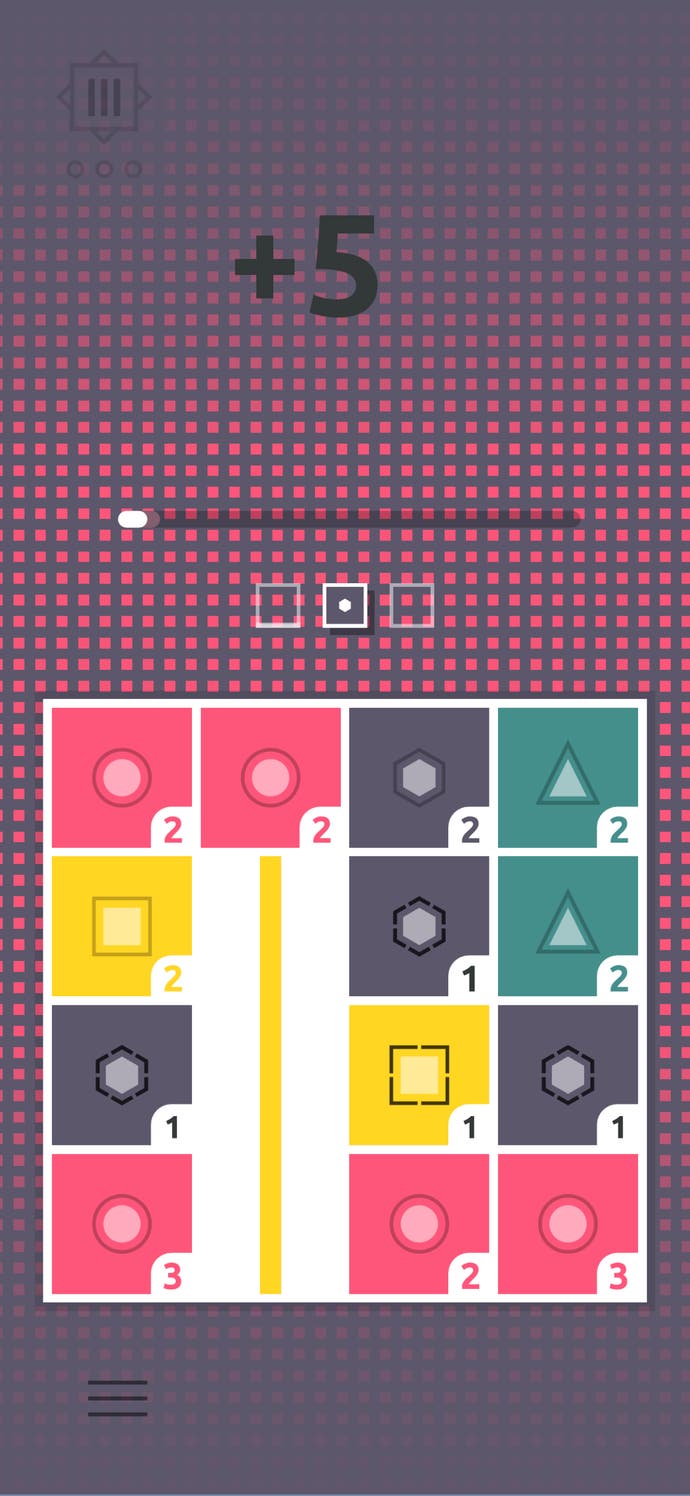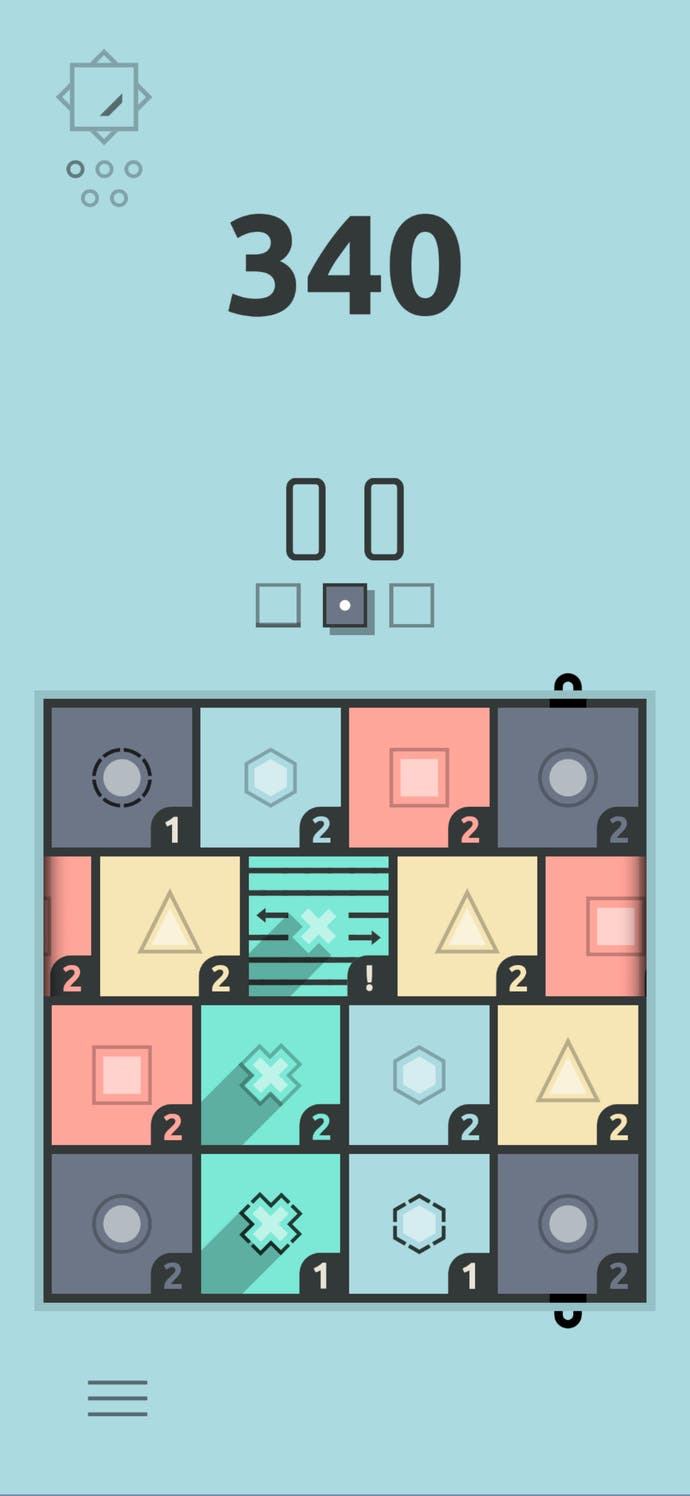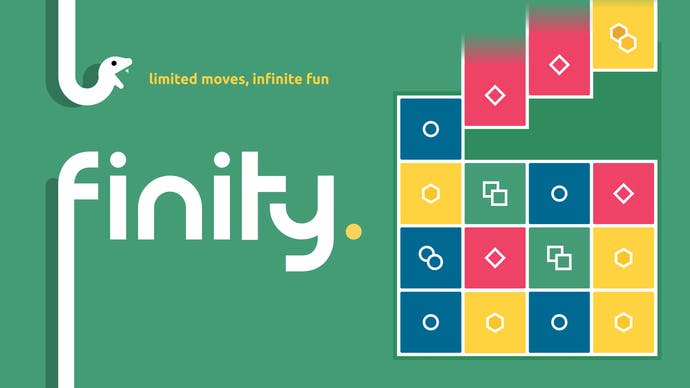Finity review - a gorgeous puzzler that pits you against your own inelegance
Locked in.
It can be odd to discover, over time, what a game is really about. Finity is a match-three game for Apple Arcade. It delights in pastel colours and endless chiming sound effects. But what it's actually about is that crucial element of first-person shooters and MMO raids. Finity is about target priorisation.
This is because, at any give moment, you might be able to make a handful of matches with the tiles on your four-by-four grid. But which match should you make? Might some be better than others? Might some be much, much worse? These simple questions turn a good game into a great one. I am still working out how to untangle it all.
The basics are simple. You have that four-by-four grid with blocks of various colours. You match blocks by shifting rows or columns, with matched blocks vanishing and creating room for new blocks to fall into view. Matches build a meter during each level, which eventually creates three special blocks that must be matched to move on to the next level. Fine.
But Finity, as the name suggests, deals in the finite. It hangs back and drops pebbles into the abyss. So there are limiting factors to all of this. Every time you move a block, in a row or column, its timer counts down. When its timer is done, the block is locked in place, which means its row or column cannot be moved anymore. This happens in stages, thankfully - first the block will be locked into either horizontal or vertical movement, but move it again and it will be locked in place completely and that's done. The only way to get rid of it from that point on is to match it.
So you don't just have to make matches, you have to make them thoughtfully. You have to be elegant, because your inelegance results in moves that do not remove blocks, which means in turn that you're just feeding those timers and working to lock the grid in place. You're tuning up the violin for your own funeral. Gah. So play the timers as much as the board, I guess? That works. If you have several moves you can make, make the moves that clear locked blocks or blocks on short timers? But what about the snooker element that only becomes apparent over time - the element that means that you'd be wise to think about the state of the board after a match has been made. Hmm. Think about both elements?

There's more. In a move that reminds me of the beautifully precise puzzler Twofold Inc, making good matches will slowly allow you to earn back a series of blocks that you can place anywhere on the grid to get you out of a spot. Or maybe you'll earn a block that allows you to reset timers. Or maybe you'll reach a point where you unlock blocks that are actually two different colours, split diagonally, which gives you the option to match with two different types of block in turn.
Those blocks you earn. They're a boon. They help. So why do they make me so much more anxious than I would be if they didn't exist? Because they contain in their utility the possibility for waste.

Words, sadly, are sometimes powerless before beauty, and this is never truer than when I find myself trying to write about puzzle games. All of what I've said about Finity is true, but none of it captures the wordless sweetness and tartness of actually playing the thing. This is a game of reverie and reverie interrupted. Your mind flows across the board, beautifully empty of thoughts as you leave all executive functions to your roving index finger, moving this row, that column, delighting in the shingling chime of match, match, match. But then you hit a row or column that's locked and you snap out of it all. It's an affront! But it's an affront that you caused, at some point back in the past. Finity, like Twofold, like Popcap's glorious Gyromancer, is a puzzle game in which you play against yourself. It's a two-player puzzle game for one person. Honestly, play it and you'll see it makes sense.
Some things, of course, are true of all puzzle games. An ascending series of chimes will never fail to get the heart beating faster. Equally, all things being equal I will be telling my grandkids one day that they should always match from the bottom of the grid when they can, to maximise the drop. But Finity does much more than it needs to. It uses the beautiful, granular haptics of iOS to turn the phone into a sort of lock box mechanism, with rows and columns that become concealed tumblers, tumblers that outline themselves in pure sensation as you move them. It's all incredibly thoughtful, and incredibly precise.
(One example will do here: move a row or column so far that you get it back to its original position and the hollow click you feel through your finger is a subtly different kind of hollow click! It's telling you you've moved back into the original alignment. It's telling you the ship's wheel has done a full rotation. I understood this immediately when I played, but I understood it completely unconsciously. I have had to play for hours to understand on a conscious level what my hand and fingers grasped from the start.)
There's so much of this stuff, from the elegant unspooling tutorials to the steady introduction of new ideas. New skins! New colours! There's an entire separate mode I haven't had time to mention yet, which takes the basics of the game and makes it musical, which actually means adding a time pressure and a sense of an ending to things.
All of this, yes, but that immediacy that powers it all. The smooth sliding of the rows, the columns. The halting moments. The clicks, the pops. The shudders.


